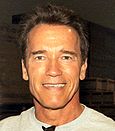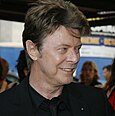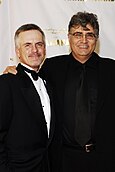Portal:Film/Selected list
| This Wikipedia page has been superseded by Portal:Film and is retained primarily for historical reference. |
| Note: List article entries are now being transcluded directly on the main portal page. However, this page should be retained for historical reference. |
Instructions
[edit]The layout design for these subpages is at Portal:Film/Selected list/Layout.
- Add a new Selected article to the next available subpage.
- The list should only contain articles that have been given a quality rating of Wikipedia:Featured lists.
- The "blurb" for all selected articles should be approximately 10 lines, for appropriate formatting in the portal main page.
- Update "max=" to new total for its {{Random portal component}} on the main page.
Selected biographies list
[edit]Shelton Jackson "Spike" Lee is an Emmy Award-winning and Academy Award-nominated American film director, producer, writer, and actor, noted for his films that deal with controversial social and political issues. Lee's films are typically referred to as "Spike Lee Joints". Lee received a Master of Fine Arts from New York University's Tisch School of the Arts, which culminated in his thesis film Joe's Bed-Stuy Barbershop: We Cut Heads, the first student film to be showcased in Lincoln Center's New Directors New Films Festival. Lee's first feature-film She's Gotta Have It was released three years later in 1986. Lee directed, produced, wrote, and acted in his first three feature-films: She's Gotta Have It, School Daze, and Do the Right Thing. Lee has starred or acted in many of his own films, including the role of Mars Blackmon, which he reprieved for a series of Nike commercials that also starred Michael Jordan. He has also been interviewed in and contributed to many documentaries. In addition to his feature-film credits, Lee has directed a number of music videos by artists such as Prince, Michael Jackson, and Anita Baker. He has also directed music videos for songs featured in films he has directed, including "Fight the Power" by Public Enemy, which was featured heavily in the 1989 film Do the Right Thing.
Arnold Schwarzenegger is an Austrian-American actor who has appeared in multiple film roles. Schwarzenegger began his acting career primarily with small roles in film and television. For his first film role, he was credited as "Arnold Strong", but was credited with his birth name thereafter. Schwarzenegger has acted in over thirty films, and has also ventured into directing and producing. He has appeared mainly in sword-and-sorcery, action, and comedy films. Schwarzenegger has been a primary character in two film franchises: as Conan in the Conan series and as Terminator in the Terminator series. Other notable roles include Ben Richards in The Running Man, Douglas Quaid in Total Recall, and Harry Tasker in True Lies. Although Schwarzenegger's acting career has been put on hold due to his position as Governor of California, he has made several cameos in various films. Upcoming cameos include the 2009 film Terminator Salvation and the 2010 film The Expendables. Schwarzenegger has received several awards and nominations for his work in films. In Stay Hungry, one of his first roles, he won a Golden Globe Award for Best Acting Debut in a Motion Picture. He has also been nominated for various awards for his work in Terminator 2: Judgment Day, Junior, and True Lies. According to Box Office Mojo, a box office revenue tracking website, films which Schwarzenegger has acted in have grossed a total of more than $1.6 billion domestically, with an average of $70 million per film.
Woody Allen is an American film director, writer, actor, jazz musician, comedian and playwright. He has contributed to many projects as either the writer, director, actor, or a combination of the three. Allen has also written four plays for the stage, including writing sketches to the Broadway revue From A to Z, and the Broadway productions Don't Drink the Water (1966) and Play It Again, Sam (1969). His first film was the 1965 comedy What's New Pussycat?, which featured Allen as both writer and performer. His directorial debut was the 1966 film What's Up, Tiger Lily?, in which a dramatic Japanese spy movie was re-dubbed in English with completely new, comic dialog. According to Box Office Mojo, Allen's films have grossed a total of more than $424 million, with an average of $12 million per film. In addition to works of fiction, Allen has appeared as himself in many documentaries and other works of non-fiction, including Stanley Kubrick: A Life in Pictures, Wild Man Blues, and The Concert for New York City. He has also been the subject of and appeared in two documentaries about himself, To Woody Allen, From Europe with Love in 1980, and Woody Allen: A Life in Film in 2001. He also wrote for and contributed to a number of television series early in his career, including the The Tonight Show as guest host. Currently, all of the films he directed for United Artists and Orion Pictures between 1969 and 1992 are owned by Metro-Goldwyn-Mayer, which acquired both studios in separate transactions.
David Bowie (born David Robert Jones) was a British musician and actor. He began his singing career under the name David Bowie in 1966 and won his first award in 1969, when he won an Ivor Novello Award for the song "Space Oddity". Bowie's first hit album was Hunky Dory in 1971 which reached number three in the UK Albums Chart. Despite his next eleven studio albums all making the UK Top 10—including four number one albums—he did not receive any more music awards or nominations until the early 1980s. He has since won eleven awards for his music, including: two BRIT Awards—Best British Male Solo Artist at the 1984 BRIT Awards and an Outstanding Contribution Award at the 1996 BRIT Awards; two Grammy Awards—Best Video, Short Form for the David Bowie video at the 1985 Grammy Awards and a Lifetime Achievement Award at the 2006 Grammy Awards; and three MTV Video Music Awards—Best Male Video for "China Girl" and a Video Vanguard Award at the 1984 MTV Video Music Awards, and Best Overall Performance in a Video for "Dancing in the Street" at the 1986 MTV Video Music Awards. Bowie began his acting career in the 1967 short film The Image. His first leading role was in the 1976 science fiction film The Man Who Fell to Earth, a role for which he won a Saturn Award for Best Actor at the 1976 Saturn Awards. He has also had an innovative presence on the Internet which led to his being awarded a lifetime achievement Webby Award in 2007 for "pushing the boundaries of art and technology with his digital empire". He has won 14 awards from 40 nominations.
Clint Eastwood is an American film actor, director, producer, and composer. After beginning his acting career primarily with small uncredited film roles and television appearances, his career has spanned more than 50 years. Eastwood has acted in several television series, most notably starring in Rawhide. His role in the eight-season series led to his leading roles in A Fistful of Dollars, For a Few Dollars More, and The Good, the Bad and the Ugly. Eastwood has appeared in over 55 films, including Hang 'Em High, Escape from Alcatraz, The Bridges of Madison County, and Gran Torino. Eastwood started directing in 1971, and in 1982, his debut as a producer began with two films, Firefox and Honkytonk Man. Eastwood also has contributed music to his films, either through performing, writing, or composing. He has mainly starred in western, action, comedy, and drama films. Eastwood has been a primary character in two film franchises: as the Man with No Name in the Dollars Trilogy and as Harry Callahan in the Dirty Harry series. Other notable roles include The Stranger in High Plains Drifter, Philo Beddoe in Every Which Way but Loose and its sequel Any Which Way You Can, Preacher in Pale Rider, and Frankie Dunn in Million Dollar Baby. Eastwood's next project will be to direct and produce the 2009 film Invictus. Eastwood has received multiple awards and nominations for his work in the films Unforgiven, Mystic River, and Million Dollar Baby, among others. These awards include Academy Awards, Directors Guild of America Awards, Golden Globe Awards, and People's Choice Awards. According to Box Office Mojo, a box office-revenue tracking website, films that Eastwood has acted in have grossed a total of more than $1.67 billion domestically, with an average of $37 million per film.
Judy Garland received numerous awards and honors in the course of a career that spanned over 40 years. Garland won or was nominated for awards for her work in motion pictures, television, music recording and on stage. She was twice nominated for an Academy Award and was awarded a special Academy Juvenile Award in 1940. Garland won a Golden Globe Award and was nominated for a second, and she received a special Tony Award for her record-breaking concert run at New York's Palace Theatre. Garland won two Grammy Awards for her concert album Judy at Carnegie Hall. Garland has also received a number of posthumous awards and honors. She was the recipient of a Grammy Lifetime Achievement Award and several of her recordings have been inducted into the Grammy Hall of Fame. She has twice been honored on United States postage stamps and has a star on the Hollywood Walk of Fame. The American Film Institute has repeatedly recognized her talent, placing Garland eighth on its list of the top 100 female stars of all time and placing five of her recordings in its list of the 100 best songs from films, including "Over the Rainbow" at number one.
Vittorio Storaro is an Academy Award-winning Italian cinematographer, and member of the American Society of Cinematographers (ASC) and Italian Society of Cinematographers (AIC). Storaro's early films were made in his homeland of Italy, where he began early collaborations with Italian director Bernardo Bertolucci, with whom he has continued to collaborate with throughout his career. Storaro and Bertolucci's first major project was the 1970 film The Conformist, based on the Italian novel of the same name. Storaro's first American film was Apocalypse Now, directed by Francis Ford Coppola. Storaro won an Academy Award for his work on the film, followed by two more Oscars for his work on Reds and The Last Emperor, and a nomination for Dick Tracy. Storaro also acted as cinematographer on films such as Last Tango in Paris, Ishtar, Bulworth, and Exorcist: The Beginning. In addition to Bertolucci and Copolla, Storaro has worked with directors such as Richard Donner, Warren Beatty, and Carlos Saura. Throughout his career, Storaro has been nominated for and won many awards for his work as a cinematographer, including a Lifetime Achievement Award from the American Society of Cinematographers.
Christopher Walken is an Academy Award-winning American actor of stage and screen. Walken, a prolific actor, has spent more than 50 years on stage and screen, and has appeared in over 100 movie and television roles, including A View to a Kill, At Close Range, The Deer Hunter, King of New York, Batman Returns and Pulp Fiction, as well as music videos by recording artists such as Madonna. Walken's early career began primarily in theatre and television, where he often played small roles with limited appearances. During these early stages of his career, Walken was credited as "Ken Walken" and later as "Ronnie Walken," until finally settling on "Christopher Walken." Walken began acting in films by 1969, and after a series of increasingly larger roles, won an Academy Award in 1978 as Best Supporting Actor for his role in The Deer Hunter. Since then, Walken has become a highly sought-after actor, typically performing in numerous films every year. Walken has been a primary character in two film franchises: as Gabriel the fallen angel in The Prophecy series, and as Jacob Witting in the made-for-television films based on Patricia MacLachlan's Sarah, Plain and Tall novels. Other notable roles include Johnny Smith in The Dead Zone, Captain Koons in Pulp Fiction, and Frank Abagnale Sr. in Catch Me if You Can. He is also co-producer of his film New Rose Hotel and also sing songs in some of his film including Puss in Boots and Hairspray, he also tries to work a jig (dance) into his movies. Christopher Walken also stars in some TV-Series and theater plays. Walken produced, wrote and directed a short film named Popcorn Shrimp, he also starred in another short film named Engine Trouble in 2002. His upcoming projects are Five Dollars a Day and The Lonely Maiden. He has been rumored for the upcoming films The Dirt and Kevin Approaches. His another film, Citizen Brando is in in-production. Some of his films are unreleased like Jungle Juice (2001).
Portal:Film/Selected list/9
Gene Kelly (1912–1996) was an American dancer, actor, singer, director, producer, and choreographer whose work in motion pictures spans from 1942 to 1996. He is probably best known today for his performances in musicals, notably An American in Paris (1951) and Singin' in the Rain (1952). Kelly made his Hollywood film debut in For Me and My Gal (1942), co-starring with Judy Garland. Afterward, he went on to work as an actor, dancer and subsequently, choreographer, in a series of musical films. In these films, his choreography included experiments with a combination of dance and animation (Anchors Aweigh and Invitation to the Dance) and dance scenes involving special effects (including the "Alter Ego" number from Cover Girl and the split-screen dance number from It's Always Fair Weather). In addition to his work as an actor and choreographer, Kelly directed or co-directed several films, some of which did not feature him in an acting role. Kelly appeared in several non-musical dramatic and comedy films as well. Kelly received an Academy Award nomination for Best Actor for his performance in Anchors Aweigh (1945) and won an Honorary Academy Award for his work in An American in Paris (1951). He was voted the 15th most popular film actor on the American Film Institute’s millennium list, while his Singin' in the Rain was voted the most popular movie musical of all time.
The Annie Award for Best Animated Home Entertainment Production is awarded annually by ASIFA-Hollywood, a non-profit organization that honors contributions to animation, to the best animated direct-to-video film of the year. It is one of the Annie Awards, which honor contributions to animation, including but not limited to producers, directors, and voice actors. The Annie Awards were created in 1972 by June Foray to honor individual lifetime contributions to animation. In 1992, the scope of the awards was expanded to honor animation as a whole; the Annie Award for Best Animated Feature was created as a result of this move, and subsequent awards have been created to recognize different contributions to animation. The Annie Award for Best Animated Home Entertainment Production was created in 1995, and has been awarded yearly since. It was originally known as the Annie Award for Best Animated Video Production; the name of the award was changed in 1997 to the Annie Award for Best Home Video Production, was changed again in 1998 to the Annie Award for Outstanding Achievement in an Animated Home Video Production, and was changed in 2002 to the current name. To be eligible for the award, the film must have been released in the year before the next Annie Awards ceremony, and the developers of the game must send a five minute sample DVD of the film to a committee appointed by the Board of Directors of ASIFA-Hollywood.
The National Film Registry is the United States National Film Preservation Board's selection of films for preservation in the Library of Congress. The Board, established by the National Film Preservation Act of 1988, was reauthorized by acts of Congress in 1992, 1996, 2005, and again in October 2008. The 1996 law also created the non-profit National Film Preservation Foundation which, although affiliated with the National Film Preservation Board, raises money from the private sector. The National Film Registry names to its list up to 25 "culturally, historically, or aesthetically significant films" each year, showcasing the range and diversity of American film heritage to increase awareness for its preservation. However, inclusion on the list is not a guarantee of actual preservation. To be eligible for inclusion, a film must be at least ten years old. For the first selection in 1989, the public nominated almost 1,000 films for consideration. Members of the National Film Preservation Board then developed individual ballots of possible films for inclusion. The ballots were tabulated into a list of 25 films which was then modified by Librarian of Congress James H. Billington and his staff at the Library for the final selection. Beginning in 1997, members of the public were able to nominate up to 50 films a year for the Board and Librarian to consider. The Registry includes films ranging from Hollywood classics to orphan films. A film is not required to be feature-length, nor is it required to have been theatrically released. The Registry contains newsreels, silent films, experimental films, short subjects, films out of copyright protection, film serials, home movies, documentaries, independent films, television movies, and music videos. As of the 2009 listing, there are 525 films preserved in the Registry. The earliest listed film is Blacksmith Scene (1893), and the most recent is Fargo (1996). The year with the most films selected is 1939, as 17 films were chosen for preservation. The time between a film's debut and its selection varies greatly. The longest span is 109 years, when the 1894 Dickson Experimental Sound Film was selected in 2003. The shortest range is the minimum 10 years; this span is shared by Do the Right Thing, Raging Bull, Goodfellas, Toy Story, and Fargo.
Portal:Film/Selected list/12
Up is a 2009 computer-animated film produced by Pixar Animation Studios and distributed by Walt Disney Pictures. The film, which premiered on May 29, 2009, in North America, became the first animated 3D film to open the Cannes Film Festival. It was directed by Pete Docter, co-directed by Bob Peterson, and produced by Jonas Rivera. The film centers on an elderly widower, named Carl Fredricksen, and a young Wilderness Explorer, named Russell, who fly to South America in a house suspended by helium balloons. The movie received both critical acclaim and box office success, opening in 3,766 theaters domestically, debuting at number one with $68,108,790 and grossing over $731 million worldwide. It garnered various awards and nominations, most of them for the "Best Animated Picture" category and for the film's soundtrack. Up was nominated for five Academy Awards at the 2010 Ceremony, winning two, for Best Animated Feature and for Best Original Score. It was the second fully animated film to be nominated for the Academy Award for Best Picture; the other was Beauty and the Beast. Up became the third consecutive Pixar film to win the Academy Award for Animated Feature, after Ratatouille and WALL-E. The film also won the Golden Globe for Best Original Score and the Best Animated Feature Film at the 67th Golden Globe Awards. Up received nine nominations for the Annie Awards in eight categories, winning two awards for Best Animated Feature and Best Directing in a Feature Production. It also was selected as the Summer Movie Comedy at the 2009 Teen Choice Awards, and was also nominated for three Grammys at 52nd Grammy Awards, winning two of them.
Nominations
[edit]- Adding articles
- Feel free to add Featured-list quality film articles to the above list.
- If you are unsure or do not know how to add an entry, feel free to post a question, suggestion or nomination here below, or at the talk page Portal talk:Film.










